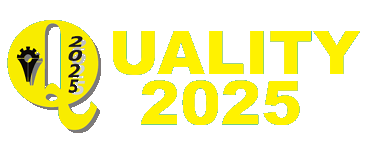The 14th Scientific/Expert Conference with international participation “Quality 2025” is traditionally organized biannually since 1999, by the University of Zenica, Dicle University (Türkiye), Agency for the Development of Higher Education and Quality Assurance of Bosnia and Herzegovina, University of Mostar, Quality Association of Bosnia and Herzegovina, and Institute of Economic Engineering IPI Zenica.
The Research/Expert Conference will be performed as follows: Plenary session (keynote and papers related to global topics), symposium (papers according to the conference topics) and the PANEL on the topic: Effects of the application of existing quality assurance models in higher education in B&H and their future perspectives. The papers will be assigned to the four areas of quality management (Business, Education & Science, Public sector, Standards & Management systems).
Submission Guidelines
All papers must be original and not simultaneously submitted to another journal or conference.
All papers are peer-reviewed by the Scientific Committee members. Authors are responsible for the technical and linguistic correctness of the text.
The official conference languages are English, Bosnian, Serbian and Croatian.
The following paper categories are welcome:
- Original Scientific Papers should report on original theoretical or practical research results. The given data must be sufficient in order to enable the experiment to be repeated with all effects described by the author, measurement results or theoretical calculations.
- Preliminary Notes (Short Communication) present one or more new scientific results but without details that allow the reported data to be checked. The papers of this category inform about experimental research, small research projects or progress reports that are of interest.
- Subject Reviews cover the state of art and tendencies in the development of the specific theory, technology and application with given remarks by the author. Such a paper ends with a list of reference literature (bibliography) with all the necessary items in the related field.
- Professional Papers (Case Studies) report on the original design of an instrument, device or equipment not necessarily resulting from the original research. The paper contributes to the application of well-known scientific results and to their adaptation for practical use.
Conference topics
- Subtopic 1: Quality in Business
- Quality management (Concept, Principles, Tools and Philosophies); System and Process Performance Measurements; Metrology; Quality of product and process; Quality in maintenance; Supply chain management; Environment protection quality; Quality Engineering; Quality Economics; Industry 4.0; Risk Control; Quality Costs and Quality Cost Management; Business Excellence
- Subtopic 2: Quality in Education and Science
- Pedagogical standards and norms; Methods and procedures for control and monitoring of student achievements; Methods and procedures of educational staff quality control; Educational institutions self-evaluation; The Bologna process; Accreditation and certification of educational programs and institutions; Legislation in the education; Accreditation in Higher Education; Independence of the QA agency; Digitization and hybrid accreditation; Quality assurance of the Joint Study programs
- Subtopic 3: Quality in the Public Sector
- Quality in public institutions; Quality in health institutions; Quality in community enterprises; Quality in Agriculture; Quality in Food Processing Industry; Aspect of Quality in EU Accesion of B&H; Quality in politics; The quality of the media; Quality in Tourism
- Subtopic 4: Standards and Management Systems
- International standards ISO 9000 – Quality Management System; International standards ISO 14000 – Environmental Management System; International standards ISO 45000 – Occupational Health and Safety; ISO 16949 – Automotive quality management systems, ISO 22000 – Food safety management system, ISO 27000 – Information security management standards, ISO 26000 – Social Responsibility, ISO 50000 – Energy Management system; Status and trends in the development of standards; Quality information systems; Quality awards; Standardization; National quality programs; TQM models and their evaluation; Integrated quality systems
Publication
Quality 2025 proceedings will be published online, as an open-access publication, ISSN 1512-9268, by the University of Zenica.
The Conference proceedings are indexed in Index Copernicus International and EBSCO Engineering Source.
Review process
The author submits the paper by email or using an online form.
The editor checks the paper’s structure against the Author Guidelines to make sure it includes the required sections and styles.
The editor sends invitations to members of the Scientific Committee he/she believes would be appropriate reviewers.
Potential reviewers consider the invitation against their own expertise, conflicts of interest and availability. They then accept or decline. If possible, when declining, they might also suggest alternative reviewers.
The reviewer reads the paper, in order to write a detailed review according to the review form. The review is then submitted to the editor, with a recommendation to accept it with or without modifications, or to reject it.
The editor sends a decision email to the author including any relevant reviewer comments (anonymized).
If accepted, the paper is prepared for publishing. If the article is rejected or sent back for either major or minor revision, the editor should include constructive comments from the reviewers to help the author improve the article. At this point, reviewers are also informed by email letting them know the outcome of their review. If the paper was sent back for revision, the reviewers should expect to receive a new version, unless they have opted out of further participation. However, where only minor changes were requested this follow-up review might be done by the editor.
Download review form (English / Bosanski) >>
This is an open access journal which means that all content is freely available without charge to the user or his/her institution. Users are allowed to read, download, copy, distribute, print, search, or link to the full texts of the articles, or use them for any other lawful purpose, without asking prior permission from the publisher or the author. This is in accordance with the BOAI definition of open access.
